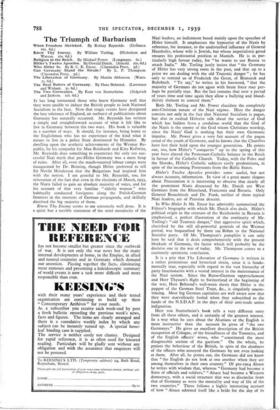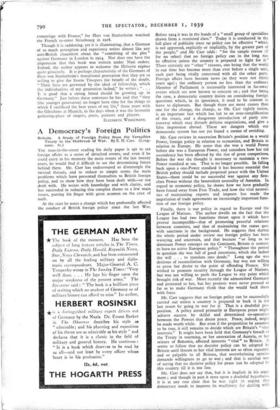The Triumph of Barbarism
(Clarendon Press. 3d.) IT has long tormented those who knew Germany well that they were unable to induce the British people to look National Socialism in the face. Now that tragic events have dissipated the lazy tolerance of England, an outburst of publications about Germany has naturally occurred. Mr. Reynolds has written a simple and straightforward account of what it felt like to live in Germany between the two wars. His book is valuable in a number of ways. It should, for instance, bring home to the Englishman who has no experience of the kind what it means to live in a police State dominated by Hinunler. By dwelling upon the aesthetic achievements of the Weimar Re- public, by his sympathy for Max Reinhardt and Kate Kollwitz, Mr. Reynolds does something to counteract the only too suc- cessful Nazi myth that pre-Hitler Germany was a mere heap of ruins. After all, even the much-vaunted labour camps were inaugurated by Dr. Bruning, though Hitler preferred to tell Sir Nevile Henderson that the Bulgarians had inspired him with the notion. I am grateful to Mr. Reynolds, too, for reiteration of the fact that even in the elections of March, 1933, the Nazis failed to gain an absolute majority of votes, and for his account of that very familiar " elderly woman " who habitually conducted foreigners along the Polish-German frontiers in the interests of German propaganda, and skilfully deceived the big majority of them.
Know Thy Enemy seems to me extremely well done. It is a quiet but a terrible statement of the utter mendacity of the Nazi leaders, an indictment based mainly upon the speeches of Hitler himself. It emphasises the hypocrisy of the Nazis by reference, for instance, to the undisturbed influence of General Haushofer, whose wife is Jewish, but whose imperialistic greed ensures his professorial position at Munich. He is in par- ticularly high favour today, for " he wants to use Russia to attack India." Mr. Teeling justly insists that " the Germany of Hitler has very strong roots in the past, and that up to a point we are dealing with the old Teutonic danger " ; he has only to remind us of Frederick the Great, of Bismarck and Rohrbach. " To say," he writes in his foreword, " that the majority of Germans do not agree with brute force may per- haps be partially true. But the fact remains that over a period of years time and time again they allow a bullying and blood- thirsty element to control them."
Both Mr. Teeing and Mr. Power elucidate the completely anti-Christian nature of the Nazi regime. Here the danger consists not only in the fact that National Socialism is pagan, but also in exalted Hitlerist talk about the service of God which has hidden from a credulous world that the God of the Nazis is the enemy of the God whom Christians worship, since the Nazis' God is nothing but their own Germanic impulse. Mr. Power gives a very fair account of the pagan creed of the youth of Germany, and he knows that the Churches have lost their hold upon the younger generation. He points out, too, how Hitler's " conquests " up 'to the spring of this year have altered the Protestant-Catholic balance in the Reich in favour of the Catholic Church. Today, with the Poles and the Slovaks, Hitler's Catholic subjects easily predominate, in spite of the incoming Protestants from the Baltic States.
Hitler's Twelve Apostles provides some useful, but not always accurate, information. In view of a great many slogans about Prussianism it is interesting to observe that nearly all the prominent Nazis discussed by Mr. Dutch are West Germans from the Rhineland, Franconia and Bavaria. Only General Brauchitsch and Dr. Funk, neither of them typical Nazi leaders, are of Prussian descent.
In Who Hitler Is Mr. Ensor has admirably summarised the Fiihrer's biography with which Mr. Dutch also deals. Hitler's political origin as the creature of the Reichswehr in Bavaria is emphasised, a perfect illustration of the continuity of Mr. Teeling's " old Teutonic danger," that aggressive spirit which, cherished by the still all-powerful generals of the Weimar period, was bequeathed by them via Rohm to the National Socialist party. Of Mr. Thompson's pamphlet it can only here be said that it deals comprehensively with the present blockade of Germany, the factor which will probably be the decisive one in the war of today. Mr. Thompson comes to a cautiously optimistic conclusion.
It is a pity that The Liberation of Germany is written in a rather pretentious and hysterical strain, since it is funda- mentally true, especially with regard to the vast hierarchy of party functionaries with a vested interest in the maintenance of the Nazi system. Since the Russo-German rapprochement and Herr Thyssen's flight to Switzerland at the beginning of the war, Herr Behrend's well-worn thesis that Hitler is the puppet of the German Steel Trust, &c., is singularly uncon- vincing. Most big German capitalists are well aware now that they were marvellously fooled when they subscribed to the funds of the N.S.D.A.P. in the days of their anti-trade union indignation.
Herr von Stutterheim's book tells a very different story from all these others, and is certainly of the greatest interest. In a way what he says about the Alsatians or the English is more instructive than the account he gives of " the two Germanys." He gives an excellent description of the British occupation of Cologne, of the friendliness of the Tommies, and of the English officers' wives, who " constituted the most disagreeable section of the garrison." On the whole, he praises the behaviour of the British, in spite of the aloofness of the officers who annoyed the Germans by not even looking at them. After all, he points out, the Germans did not know that " the English do not look at one another when they are among themselves in their own country." Of pre-1914 Alsace he writes with wisdom that, whereas " Germany had become a State of officials and soldiers," "Alsace had become a Western democracy, with a social structure that was as dissimilar from that of Germany as were the mentality and way of life of the two countries." There follows a highly interesting account of how " Alsace adorned itself like a bride for the day of its
remarriage with France," for Herr von Stutterheim watched the French re-enter Strasbourg in 1918.
Though it is saddening, yet it is illuminating, that a German of so much perception and experience writes almost like any anti-British chauvinist about the " contriving of the plot " against Germany in London in 1914. Nor does one have the impression that this book was written under Nazi orders. Indeed, the author appears to welcome the Hitlerist regime quite genuinely. It is perhaps characteristic of the Germans of Herr von Stutterheim's transitional generation that they are so willing to give the Storm Troopers the benefit of the doubt. " Their lives are governed by the ideal of fellowship, which the individualists of my generation lacked," he writes ; " . . . It is good that a strong breed should be growing up in Germany." Just before these sentences he has said that " they (the younger generation) no longer have time for the things to which I sacrificed the best years of my life," those years with the Gleichens at Munich, in the days when it was the favourite gathering-place of singers, poets, painters and players.
ELIZABETH WISKEMANN.













































 Previous page
Previous page